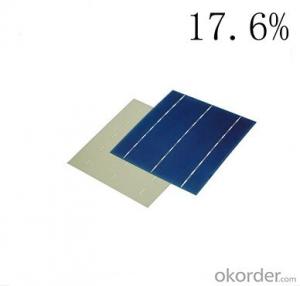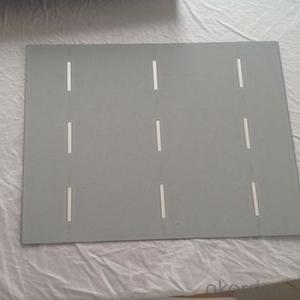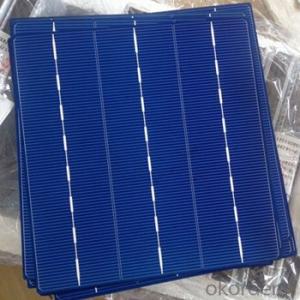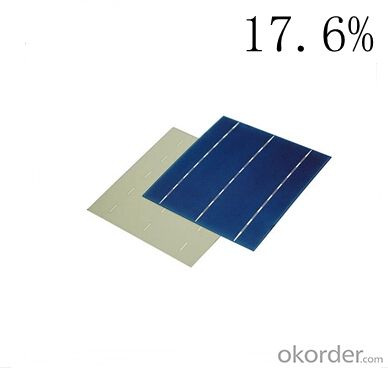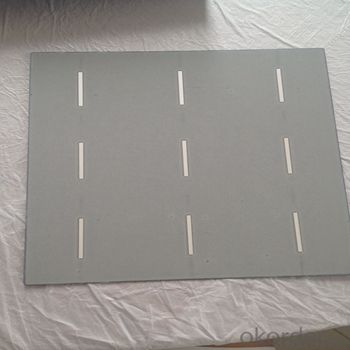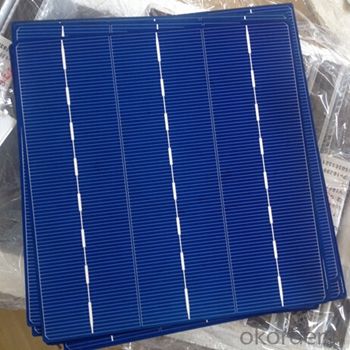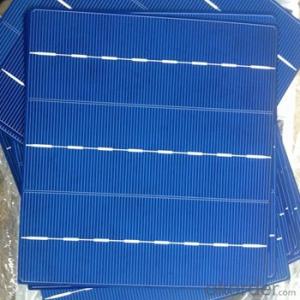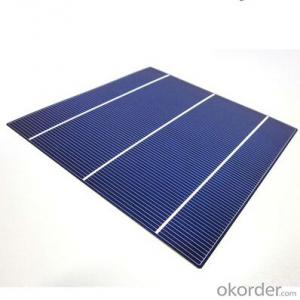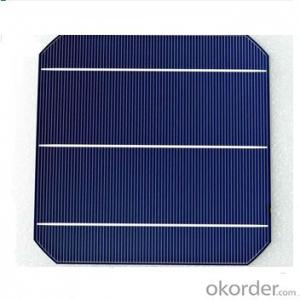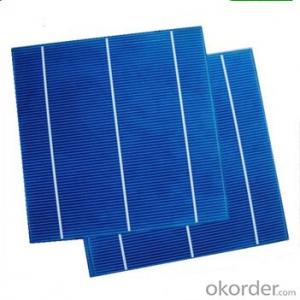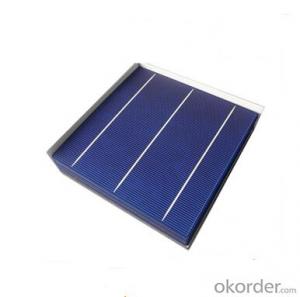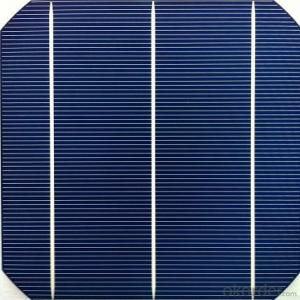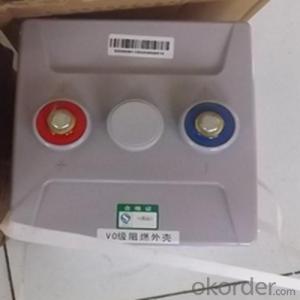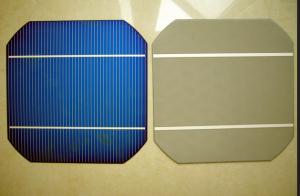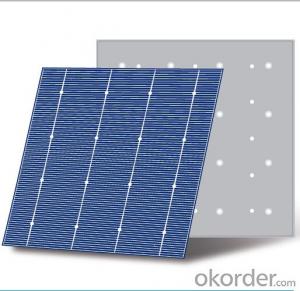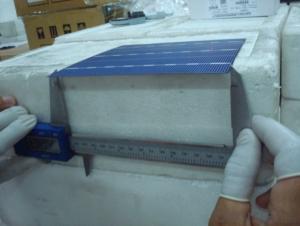High Efficiency Silver Polycrystalline Silicon Solar Cells with Stable Performance
- Loading Port:
- Shanghai
- Payment Terms:
- TT or LC
- Min Order Qty:
- 5000 pc
- Supply Capability:
- 8000000 pc/month
OKorder Service Pledge
OKorder Financial Service
You Might Also Like
Polycrystalline Silicon Solar Cells:
Solar cells is made by solar wafer, it has three categories of solar cell right now, monocrystalline polycrystalline and thin film,These cells are entirely based around the concept of ap-n junction, which is the critical part of solar module, it is the part that can convert the light energy into electricity, the thickness is from 180um to 200um, with even busbars to conduct electricity, textured cell can decrease diffuse reflection; they are often electrically connected and encapsulated as a module. Photovoltaic modules often have a sheet of glass on the front (sun up) side, allowing light to pass while protecting semiconductor wafers from abrasion and impact due to wind-driven debris, rain, hail, etc. Solar cells are also usually connected in series in modules, creating an additive voltage. Connecting cells in parallel will yield a higher current;With high quality and stable quality. Our Cells can greatly improve the performance of Solar Modules.
Polycrystalline Silicon Solar Cells Advantage:
• High efficiency and stable performance in photovoltaic conversion.
• Advanced diffusion technique ensuring the homogeneity of energy conversion efficiency of the cell.
• Advanced PECVD film forming, providing a dark blue silicon nitride anti-reflection film of homogenous color and attractive appearance.
• High quality metal paste for back surface and electrode, ensuring good conductivity, high pulling strength and ease of soldering.
• High precision patterning using screen printing, ensuring accurate busbar location for ease with automatic soldering a laser cutting.
Applications of Polycrystalline Solar Cells
Assemblies of photovoltaic cells are used to make solar modules which generate electrical power from sunlight, as distinguished from a "solar module" or "solar panel". A solar array generates solar power using solar energy.
Packaging & Delivery of Polycrystalline Solar Cells
Carton Box Package and Deliver by air. It should be noticed that it should be avoid of water, sunshine and moist.
Specification:
Mechanical data and design |
Format - 156 mm × 156 mm ± 0.5 mm |
Thickness- - 200 μm ± 20 μm |
Front (-) - 1.4 mm bus bars (silver),blue anti-reflection coating (silicon nitride) |
Back (+) - 2 mm wide soldering pads (silver) back surface field (aluminium) |
Temperature Coefficient of Cells |
Voc. Temp .coef.%/K -0.364%/K |
Isc . Temp .coef.%/K +0.077%/K |
Pm. Temp. coef.%/K -0.368%/K |
Electrical Characteristic |
Efficiency (%) Pmpp (W) Umpp (V) Impp (A) Voc (V) Isc (A) |
18.00% 4.380 0.538 8.141 0.634 8.740 |
17.90% 4.356 0.538 8.097 0.634 8.725 |
17.80% 4.331 0.537 8.065 0.633 8.710 |
17.70% 4.307 0.536 8.035 0.632 8.695 |
17.60% 4.283 0.535 8.006 0.631 8.680 |
17.50% 4.258 0.534 7.974 0.630 8.665 |
17.40% 4.234 0.533 7.944 0.629 8.650 |
17.30% 4.210 0.532 7.914 0.628 8.635 |
17.20% 4.185 0.531 7.88 -- 0.627 -- 8.620 |
17.10% 4.161 0.530 7.851 0.626 8.605 |
17.00% 4.137 0.529 7.820 0.625 8.590 |
Intensity Dependence |
Intensity [W/m2] Isc× [mA] Voc× [mV] Pmpp |
1000 1.00 1.000 1.00 |
900 0.90 1.000 0.90 |
800 0.80 0.99 0.80 |
500 0.50 0.96 0.49 |
300 0.30 0.93 0.29 |
200 0.20 0.92 0.19 |
IV Curve

Solar Panel Images:
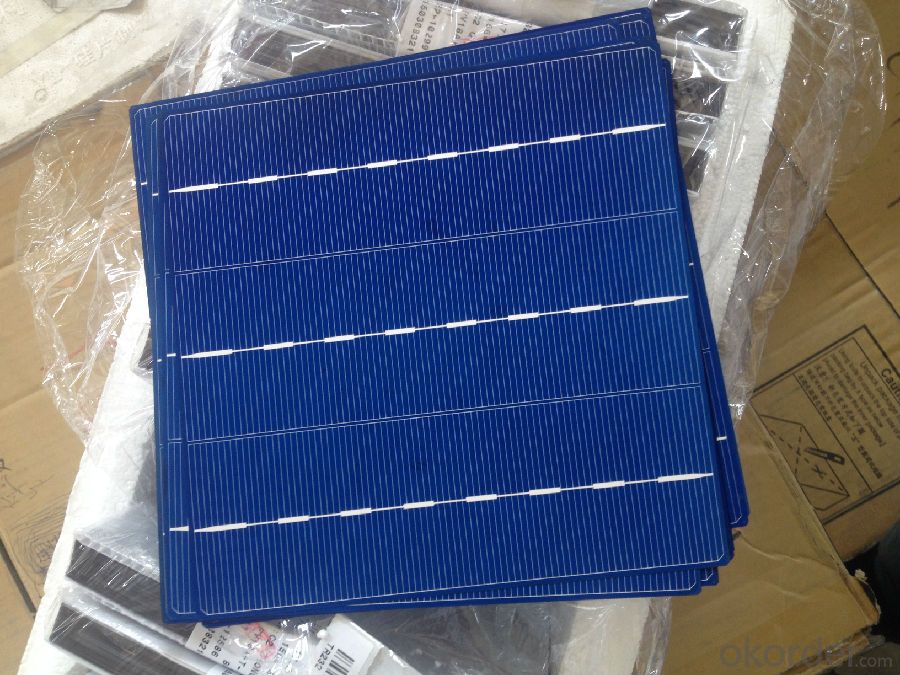
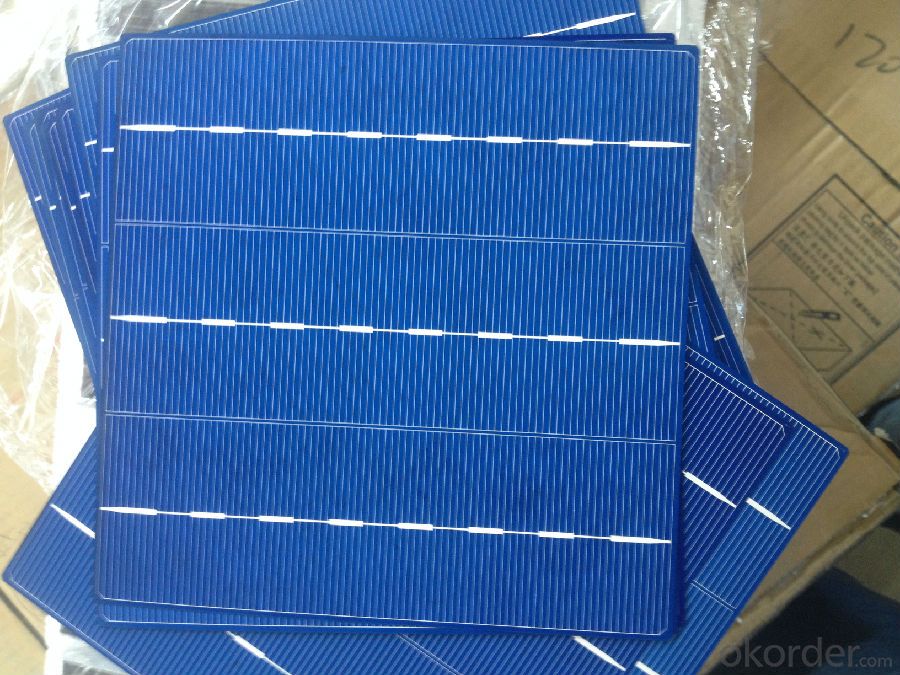
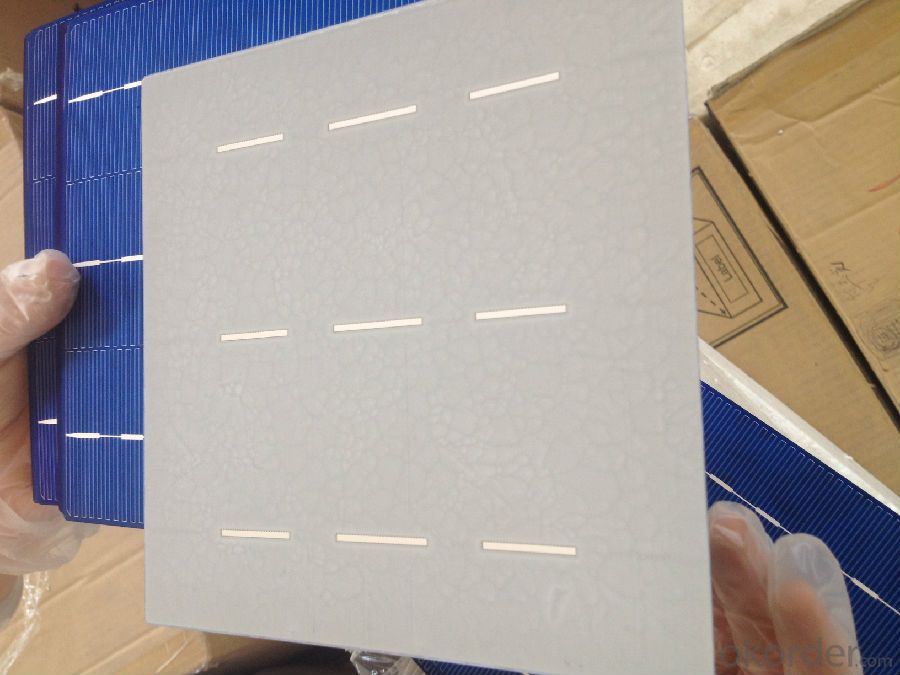
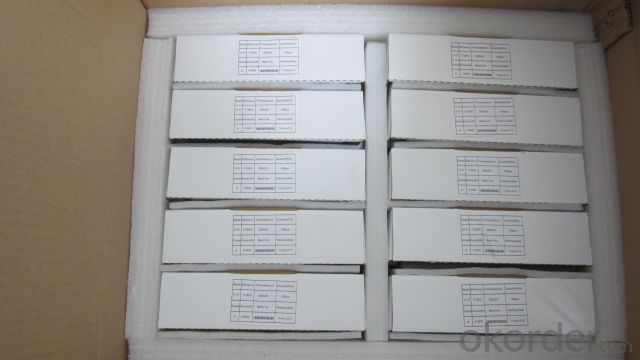
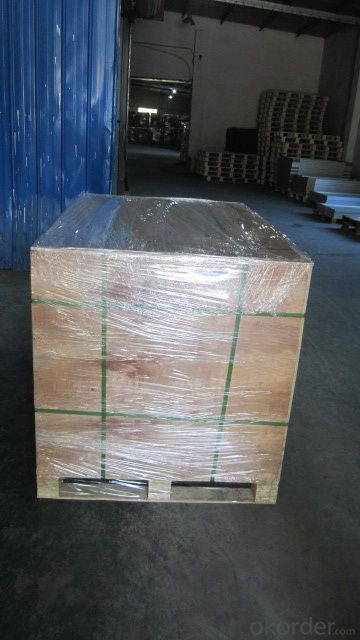
FAQ
We have organized several common questions for our clients,may help you sincerely:
①What price for each watt?
It depends on the efficiency of the solar cell, quantity, delivery date and payment terms.
②How long can we receive the product after purchase?
In the purchase of product within three working days, We will arrange the factory delivery as soon as possible. The pecific time of receiving is related to the state and position of customers.Commonly 7 to 10 working days can be served.
③Can you provide the peripheral products of the solar panels, such as the battery, controller, and inverter? If so, can you tell me how do they match each other?
Yes, we can, we have two companies for solar region, one is CNBM International, the other is CNBM engineering Co.
We can provide you not only the solar module but also the off grid solar system, we can also provide you service with on grid plant.
④What is your warranty of solar cell?
Our product can promise lower than 0.3% open box crack, we support claim after opening the box if it has crackm color difference or sth, the buyer should give pictures immediately, we can not accept the claim after the solar cell has assembled to solar panel.
• Timeliness of delivery
• ⑤How do you pack your products?
We have rich experience on how to pack the solar cell to make sure the safety on shipment, we could use wooden box or pallet as buyer's preference.
⑥ Can you do OEM for us?
Yes, we can.
Points to note when buy solar cells
Since the input of solar energy photovoltaic power generation system is unstable, it is generally required to configure the battery system to work, and solar lighting is no exception which you must configure the battery to work. Generally three are lead-acid batteries, Ni-Cd batteries and Ni-H batteries; their capacity and system reliability selection directly affect the price of the system. Choice of battery capacity generally follow the following principles: First, to meet the night lighting under the premise, as far as possible the energy stored during the day and down the solar cell module, but also capable of storing electrical energy to meet the continuous rainy days night lighting needs. Battery capacity is too small cannot meet the needs of lighting at night; the battery capacity is too large, while the battery is always in the state of power loss, affecting battery life, while wastage.
Select dispensing form when buy solar cells
Currently, there are mainly two kind’s packages of solar cells: Epoxy and laminates. Lamination process ensures that the solar battery life is more than 25 years; though epoxy is beautiful, the solar battery life is only 1 to 2 years. Therefore, 1W power solar lawn below the small, in the absence of the high life requirements of the situation, you can use the dispensing package, there are provisions for the life of the solar light, it is recommended to use laminated package. Further, there is a dispensing package for silicone gel solar cells, the working life of that solar cell is said to be up to 10 years.
Select the power when buy solar cells
Output power WP we mean is the output power of the solar cell under the standard sunlight , 101 standard, radiation intensity 1000W / m2, the air quality of AM1.5, cell temperature 25 ℃ conditions, which is by the European Commission. This condition is probably the same conditions with the usual sunlight sunny around noon, which is not, as some people imagine that kind, as long as the sun will have a rated output power, even at night that the solar lamp can be used normally. That is to say, the solar cell output power is random, at different times, different locations, also a solar cell output power is different. When people buy solar lights, in between aesthetics and energy, most of them choose energy-saving.
- Q: What is the role of solar cells in reducing carbon emissions?
- Solar cells play a crucial role in reducing carbon emissions by harnessing the power of sunlight to generate clean and renewable electricity. By converting solar energy into electricity, solar cells eliminate the need for fossil fuel combustion, which is a major source of carbon emissions. This sustainable energy source helps to reduce our reliance on carbon-intensive power generation methods, thus mitigating the greenhouse gas emissions responsible for climate change.
- Q: How do solar cells impact energy security?
- Solar cells positively impact energy security by providing a reliable and sustainable source of electricity. As they generate power from sunlight, solar cells reduce dependence on fossil fuels, which are finite and contribute to environmental degradation. By diversifying the energy mix and promoting renewable energy adoption, solar cells enhance energy resilience and reduce vulnerability to price fluctuations and supply disruptions. Additionally, solar cells can be deployed in remote areas, increasing access to electricity and improving energy security for off-grid communities.
- Q: How do solar cells handle high winds or hurricanes?
- Solar cells are designed to withstand high winds and hurricanes due to their robust construction and installation techniques. The panels are securely anchored to rooftops or mounted on sturdy frames, ensuring they can withstand strong winds. Additionally, solar panels are tested and rated for wind resistance, with most systems being rated to withstand wind speeds of up to 140 miles per hour. Therefore, solar cells are designed to handle high winds and hurricanes with minimal damage or risk of detachment.
- Q: Which one is better on the solar cells panel? The Monocrystal Solar Energy Cell or photovoltaic cell?
- I tried both, and I noticed that photovoltaic cell is better at collecting the sunlight, which can be converted into the power supply I need. In this way, I think photovoltaic cell is the best!
- Q: What is the impact of bird nesting on solar cell performance?
- The impact of bird nesting on solar cell performance can be significant. Bird nests can obstruct sunlight from reaching the solar panels, reducing their efficiency and overall power output. Additionally, bird droppings can accumulate on the surface of the panels, creating a layer that further hinders the absorption of sunlight. Regular maintenance and cleaning are necessary to ensure optimal performance and prevent any long-term damage caused by bird nesting.
- Q: How do solar cells perform in areas with high levels of radiation?
- Solar cells perform well in areas with high levels of radiation. The excess radiation actually increases the energy output of the solar cells, allowing them to generate more electricity.
- Q: How do solar cells perform in areas with high levels of chemical pollutants?
- Solar cells can be negatively affected by high levels of chemical pollutants in the air. The presence of pollutants can reduce the efficiency of solar cells by blocking sunlight and creating a layer of dirt or grime on the surface of the cells. This can lead to a decrease in electricity generation and overall performance of the solar cells. Regular cleaning and maintenance can help mitigate the impact of chemical pollutants on solar cell performance.
- Q: What is the effect of dust or dirt on solar cell performance?
- The presence of dust or dirt on solar cell surfaces can significantly decrease their performance by reducing the amount of sunlight reaching the cells and interfering with the efficient transfer of electrons. This can lead to a decrease in the overall power output of the solar system. Regular cleaning and maintenance are essential to ensure optimal performance and maximize energy production.
- Q: What is the role of bypass diodes in solar cell systems?
- The role of bypass diodes in solar cell systems is to minimize the impact of shading or partial module failure. They allow current to bypass the shaded or malfunctioning cells, preventing them from reducing the overall performance of the system.
- Q: Can solar cells be used in space exploration?
- Yes, solar cells can be used in space exploration. Solar cells are commonly utilized in space missions to generate electrical power from sunlight, as they are an efficient and reliable source of energy in the vacuum environment of space. They have been employed in various spacecraft and satellites to power systems and instruments, including communication devices, scientific instruments, and propulsion systems. Solar cells are essential for prolonged missions in space, as they provide a sustainable and renewable source of energy.
Send your message to us
High Efficiency Silver Polycrystalline Silicon Solar Cells with Stable Performance
- Loading Port:
- Shanghai
- Payment Terms:
- TT or LC
- Min Order Qty:
- 5000 pc
- Supply Capability:
- 8000000 pc/month
OKorder Service Pledge
OKorder Financial Service
Similar products
Hot products
Hot Searches
Related keywords
